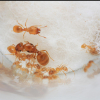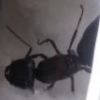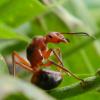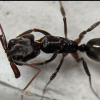- Formiculture.com
- Forums
- Gallery
- Members
- Member Map
- Chat

Pheidole bicarinata polygynous?
Started By
CatsnAnts
, Jun 26 2019 3:38 AM
9 replies to this topic
#1
 Offline
-
Posted June 26 2019 - 3:38 AM
Offline
-
Posted June 26 2019 - 3:38 AM
I caught 2 Pheidole bicarinata queens last night (yay!) and I was wanting to know whether or not they would do better together or alone?
Spoiler
#2
 Offline
-
Posted June 26 2019 - 5:04 AM
Offline
-
Posted June 26 2019 - 5:04 AM
Put them separate. They grow extremely quickly, and even if they were not polygynous, they would out grow a test tube in a few months.
Edited by Ant_Dude2908, June 26 2019 - 7:32 AM.
My Main Journal | My Neivamyrmex Journal | My Ant Adoption | My YouTube
Join the TennesseeAnts Discord Server! https://discord.gg/JbKwPgs
#3
 Offline
-
Posted June 26 2019 - 5:10 AM
Offline
-
Posted June 26 2019 - 5:10 AM
Put them separate. They grow extremely quickly, and even if they were polygynous, they would out grow a test tube in a few months.
Alright, will do!
Spoiler
#4
 Offline
-
Posted June 26 2019 - 6:44 AM
Offline
-
Posted June 26 2019 - 6:44 AM
Good luck with your pheidole! I've been wanting some so best of luck.
My Journal featuring all of what I'm keeping
Keeper of:
x2 Camponotus Novaeboracensis Queen(s)
x2 Camponotus Pennsylvanicus Queen(s)
x1 Tetramorium Immigrans Queen(s)
x1 Tetramorium Immigrans Colony
x1 Tapinoma Sessile Colony
#5
 Offline
-
Posted June 26 2019 - 7:12 AM
Offline
-
Posted June 26 2019 - 7:12 AM
Good luck with your pheidole! I've been wanting some so best of luck.
Thank you!
- TennesseeAnts likes this
Spoiler
#6
 Offline
-
Posted September 5 2019 - 6:50 AM
Offline
-
Posted September 5 2019 - 6:50 AM
Oki so my four queen Pheidole bicarinata colony has 35 workers (including 3 majors!) and a ton of brood....
My Main Journal | My Neivamyrmex Journal | My Ant Adoption | My YouTube
Join the TennesseeAnts Discord Server! https://discord.gg/JbKwPgs
#7
 Offline
-
Posted September 5 2019 - 2:07 PM
Offline
-
Posted September 5 2019 - 2:07 PM
locally they aren't but some queens I caught that I think are bicar did well together. In possesion of Silq.
#8
 Offline
-
Posted September 6 2019 - 5:13 AM
Offline
-
Posted September 6 2019 - 5:13 AM
They are probably a species complex, like dentata, certain populations seem to be polygynous while others arent
- TennesseeAnts likes this
#9
 Offline
-
Posted September 6 2019 - 5:17 AM
Offline
-
Posted September 6 2019 - 5:17 AM
They are probably a species complex, like dentata, certain populations seem to be polygynous while others arent
Yes! I was thinking about this the other day. I found five queens from an area in Nashville and my current four in Coopertown. The queens I got in West Nashville killed each other, but my queens that I got from Coopertown now have a thriving colony.
My Main Journal | My Neivamyrmex Journal | My Ant Adoption | My YouTube
Join the TennesseeAnts Discord Server! https://discord.gg/JbKwPgs
#10
 Offline
-
Posted September 8 2019 - 7:04 PM
Offline
-
Posted September 8 2019 - 7:04 PM
Pheidole bicarinata are generally pleometrophic. The queens will cooperate during founding and into the first generation, but after a number of generations have eclosed the queens will fight/the workers will pick 1 queen and kill the rest. Some populations may be truly polygynous, but most have been recognized as pleometrophic.
- TennesseeAnts likes this
I like leafcutter ants. Watch The Ultimate Guide to Fungus Growing Ants:
https://youtu.be/VBH...4GkxujxMETFPt8U
This video took like over 100 hours of work, you should for sure watch it.
1 user(s) are reading this topic
0 members, 1 guests, 0 anonymous users



















